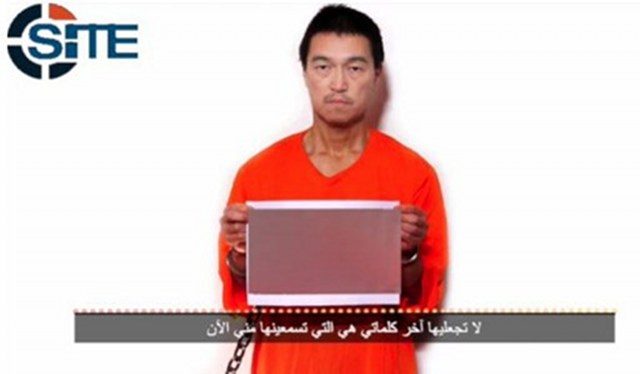SUMMARY
This is AI generated summarization, which may have errors. For context, always refer to the full article.

MANILA, Philippines – The Philippines condoled with its close ally Japan after the brutal terror group Islamic State of Iraq and Syria (ISIS) claimed to behead one of two Japanese hostages.
The Philippine Department of Foreign Affairs (DFA) condemned the apparent beheading of Japanese Haruna Yukawa, whose death ISIS announced in a video released on Saturday, January 24.
“Such heinous acts have no place in civilized society. We stand in solidarity with Japan and the international community,” the DFA said in a statement released Monday evening, January 26.
A self-described military contractor and adventurer, Yukawa first appeared in a video ISIS released on Tuesday, along with his friend, Japanese journalist Kenji Goto. ISIS then demanded that Japan pay $200 million in ransom in 72 hours, the same amount Tokyo gave in humanitarian aid to countries fighting the militants.
On Saturday, another video was released showing Goto holding a photo supposedly of Yukawa’s decapitated body.
A voice claiming to be Goto’s made a new demand in exchange for his freedom: the release of Iraqi jihadist Sajida Mubarak al-Rishawi, detained for her botched role in the 2005 hotel bombings in Amman, Jordan, that killed 60.
Japanese Prime Minister Shinzo Abe, along with Japanese and US analysts, said the recent video seems to be authentic.
The Philippines joined the international community in denouncing the killing of the 42-year-old Yukawa.
United States President Barack Obama called it a “brutal murder” while the UN Security Council branded it as “a heinous and cowardly act.”
British Prime Minister David Cameron stood by Abe’s decision not to pay ransom. “Britain strongly supports the firm stance Prime Minister Abe and his Government has taken.”
Other European nations are known to secretly pay terrorists ransom to secure the release of their citizens.
ISIS also an Asian problem
The recent beheading shows how ISIS poses a threat beyond the Middle East and the West.
Like other foreign terrorist fighters, extremists from Southeast Asia travelled to Syria and Iraq to fight with ISIS.
Other militants like those from local groups like the Philippine-based Abu Sayyaf and the Bangsamoro Islamic Freedom Fighters pledged allegiance to ISIS.
“We stand in solidarity with Japan and the international community as we reiterate our resolve to do our share in the fight against extremism, terrorism, and crimes against humanity,” the DFA said.
Last year, Manila offered to help the US-led coalition against ISIS but the government has yet to detail its assistance.
In Tokyo, public opinion is split between criticizing the hostages for taking risks, and blaming Abe’s assertive foreign policy for contributing to the hostage-taking.
Abe has supported proposals to change Japan’s pacifist constitution, and legislation to allow the Japanese military to help allies in regional conflicts threatening Japan’s security.
Japan’s prime minister said the hostage crisis will not change his foreign policy.
“We will never give in to terrorism, and we will actively contribute to the peace and stability of the world together with the international community. We are not wavering at all on this policy.” – Rappler.com
Add a comment
How does this make you feel?
There are no comments yet. Add your comment to start the conversation.